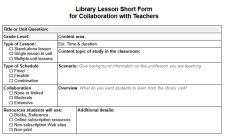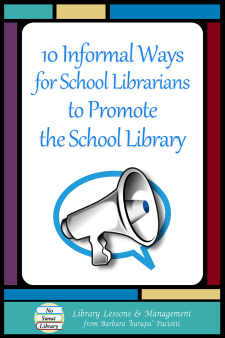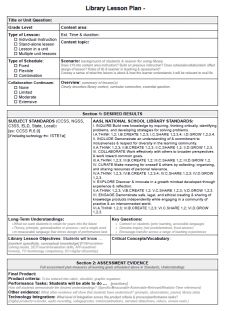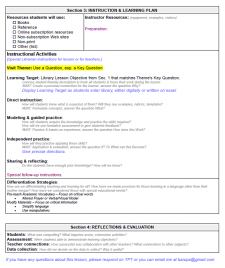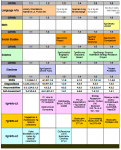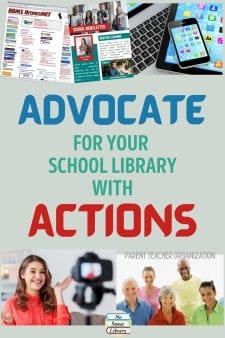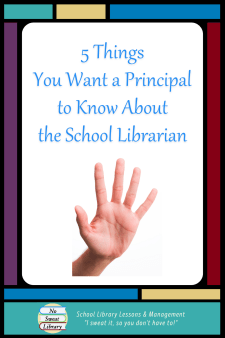 Toward the end of a school year, a School Librarian may decide to transfer to another school or leave the district for a librarian position elsewhere. In either case, a job interview with a school principal is around the corner. Alternatively, our school may get a new principal and we want her/him to know how to support the school library.
Toward the end of a school year, a School Librarian may decide to transfer to another school or leave the district for a librarian position elsewhere. In either case, a job interview with a school principal is around the corner. Alternatively, our school may get a new principal and we want her/him to know how to support the school library.
Even if we are not making a change, School Librarians nowadays must always be ready to defend our position within the school building, and in the district and the community. Sometimes a quick “elevator pitch” is enough, but at times we have to express our needs in order to serve the needs of our students and their school library program. This question can help us narrow our focus so we are, in fact, giving the “big picture” to those who can make a difference:
What 5 things do I want a principal to know about me, the School Librarian,
and about the school library?
1) I am a Teacher.
My primary role is as a teacher of information literacy. I have a set of National Standards which provide a framework for the knowledge and skills students are expected to master by the time they move on to their next school or future endeavor.
To fully integrate the information literacy curriculum into content-area lessons, I need to collaborate with teachers. Research shows that regular collaboration between the school librarian and other teachers greatly increases student achievement, so I need the principal to actively encourage faculty to collaborate with me. I document collaborations in reports and my end-of-year appraisal, and it would be helpful if the principal recommends that teachers tally their own collaborations with me.
| Download this short PDF Library Lesson Collaboration Short Form from my FREE School Librarian Resources page. Make copies and keep stacked on the circulation counter, to use for a collaboration opportunity when a teacher comes into the library. |
2) I need sufficient funding to maintain a quality school library.
 To ensure student achievement, the school library collection—print, digital, and online—must be from authoritative sources, with current publication dates, and in support of student and teacher curricular needs. To maintain this quality, I need a budget that will provide for the acquisition of new resources and the replacement of out-of-date, lost, and damaged ones.
To ensure student achievement, the school library collection—print, digital, and online—must be from authoritative sources, with current publication dates, and in support of student and teacher curricular needs. To maintain this quality, I need a budget that will provide for the acquisition of new resources and the replacement of out-of-date, lost, and damaged ones.
Most states have guidelines for the library budget and for a minimum number of materials. Here is an example of one state—Texas**—which falls about the middle of all U.S. States for library guidelines:
- Resources budget for print and non-print materials=
$5500 or $12.00 x Average Daily Attendance - Operational budget=6% of Resources budget
- An Acceptable school library has a minimum of
11,000(secondary)/12,000 (elementary) books or 12/14 books per student,
plus at least 250 videos, 46 audios, 12 periodicals - Refresh annually at least 3% of materials, licensed databases, and other electronic resources, including audiobooks and eBooks.
I also need funds from the principal for building media that cannot be purchased with library funds. Such incidental audio/video/digital items include cameras or computer products that teachers check out for student projects.
3) Make my morning/lunch/afternoon duties in the school library.
For some students, these are the only times during the day they can come into the library to check out a book. Students may be sent to the library by morning-duty teachers to take make-up tests or to review videos or classroom presentations. For students on sports teams or with difficult home situations, these library times are a “homework hub” that allows them to keep up with school work. For project-based inquiry learning, this is also the best time and place for students to collaborate on projects!
Teachers rely on me to be available at these times to help gather materials for their classrooms or collaborate on lessons. This is also when I can sponsor a library club for students who like to help shelve books and other volunteer tasks. On busy days, this may be the only planning time I have to prepare library lessons for class visits.
Make a powerful statement to students and teachers that
the School Library is an important learning center in our school
by allowing me to be in the school library during these critical times.
4) I am a department head, even if I’m the sole library unit.
 I need my principal to include me in various decision-making meetings, especially those that affect library use or curriculum and technology materials. I can provide a unique perspective that no one else can:
I need my principal to include me in various decision-making meetings, especially those that affect library use or curriculum and technology materials. I can provide a unique perspective that no one else can:
- I am broadly familiar with every subject-area teacher’s curriculum.
- I may be the most proficient technology specialist in the building.
- Along with the custodian and school secretary, I have extensive knowledge of the physical building.
- As the library program administrator, I have contacts in district offices and departments that can ease the acquisition of supplemental materials or equipment for classroom, school or extracurricular plans.
- Library activities touch every subject and grade level, so I often see and hear more of student and/or teacher issues than others.
A principal will want to take advantage of the wealth of knowledge and information a school librarian can provide to any committee or meeting.
5) The library may be empty, but I really am busy working.
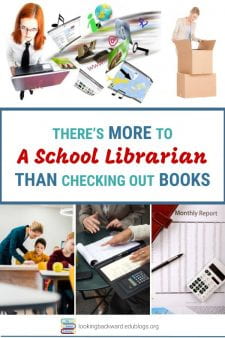 Being a School Librarian is a demanding job, as I must manage my time among the 5 areas of expertise that help me contribute to student success. Here are just a few of the “invisible” tasks that absorb my time when I’m not checking out or shelving books or teaching a lesson to students:
Being a School Librarian is a demanding job, as I must manage my time among the 5 areas of expertise that help me contribute to student success. Here are just a few of the “invisible” tasks that absorb my time when I’m not checking out or shelving books or teaching a lesson to students:
- Teacher: create my Library Lesson Plans for student visits.
blank space - Instructional partner: plan lessons with teachers, prepare materials for teachers, prepare student/teacher audio/video/digital projects.
blank space - Information specialist: phone or meet with book and digital vendors, generate purchase orders for new print & digital materials and equipment, unpack, process, and shelve new print and audio/video materials for the collection, inventory materials and equipment in the library and throughout the building.
blank space - Program administrator: manage the library facility, including scheduling, in an equitable manner according to need, balance the budget, generate reports on circulation, overdue books, library use, collaborative lessons, and curriculum that help you and me make decisions to benefit our campus.
blank space - Education leader: update the library website, create and manage library print & social media communications to parents and the community, create presentations for staff development training, keep up with my own professional learning, and with library and educational trends.
MAKE MY DREAMS COME TRUE!
To conclude, please remember that this isn’t about me, the School Librarian, but rather it’s to provide students with access to high-quality resources when they need them. And that can only happen when you understand that my needs are the needs of the School Library Program. When you support me in the above 5 ways, it is a dream come true!
| If you like this article, you can download this 2-sided PDF document explaining the 5 important ways to best support the School Librarian and the School Library Program and give a copy to your principal. | 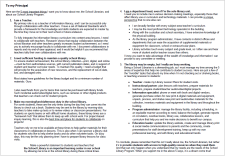 |
![]()
**School Library Programs: Standards and Guidelines for Texas. Texas State Library & Archives Commission and the Texas Education Agency, updated 2017. Accessed 8/15/2023.

